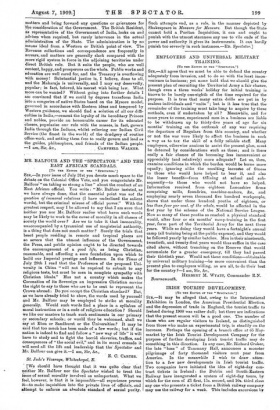EMPLOYERS AND UNIVERSAL MILITARY TRAINING.
rro THE EDITOR OF TUB " SPZCTAT011.1 Sin,—All agree that we must be able to defend the country adequately from invasion, and to do so with the least incon- venience to business; yet some hold that we should give the present plan of recruiting the Territorial-Army a fair chance, though even a three weeks' holiday for initial training is known to be barely one-eighth of the time required for the purpose. It is true that many extra drills are put in by zealous individuals and "units "; but is it less true that the remainder of the training must take long to acquire by these methods, even if undertaken by all ? Meanwhile, and for some years to come, experienced men in a business are liable to be withdrawn up to thirty-five years of age for six months' training on the outbreak of any war requiring the departure of Regulars from this country, and whether or not the war were likely to affect the business in such a way as to tax the skill of a fully reliable staff. Many employers, otherwise anxious to assist the present plan, must be deterred by considerations such as these; and is there really a fair chance of its becoming less inconvenient or appreciably (and relatively) more adequate? Let us, then, examine' conditions in which the burden would be borne more equally; ignoring alike the resulting increase of fitness to those who would have helped to .bear it, and also the lesser benefit—from training at school and sub- sequently—to those who would not have so helped. Information received from eighteen Lancashire firma comprising mills, foundries, machine-makers, &o., and employing nearly seven thousand five hundred workpeople, shows that under three hundred youths of eighteen, or less than four per cent. of the whole, would be affected in the first year by the scheme of the National Service League. Now so many of these youths as reached a physical standard would, after four or six months Camp-training in the first year, form part of the Territorial Army for the next three years. While so doing they would hate a fortnight's annual camp (all training being at the public expense), and they would be followed yearly by similar batches. Men ih their nineteenth, twentieth, and twenty-first years would thus suffice in the case cited above, without trenching on the Reserve that would accumulate for ' a greater emergency, till they had passed their thirtieth year. Would not these conditions—obtainable by universal military training—be more convenient than the present plan to employers willing, as are all, to do their best for the country 11—I am, Sir, &c., '






































 Previous page
Previous page